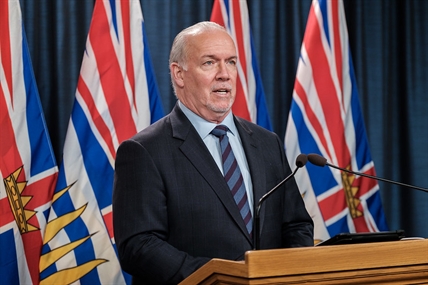Elevate your local knowledge
Sign up for the iNFOnews newsletter today!
Sign up for the iNFOnews newsletter today!
Selecting your primary region ensures you get the stories that matter to you first.

As the province prepares to crack down on unnecessary travel, provincial authorities are showing increased frustration with those breaking COVID-19 rules, especially in light of the fact a child under the age of two died from COVID over the weekend.
Premier John Horgan lashed out, during a news conference today, April 19, in response to a question about people crowding beaches in the Lower Mainland over the weekend.
“I share the views of the overwhelming majority of British Columbians that it is profoundly disappointing to see behaviour of that kind at a time when we’re close to getting out of what has been the worst year of our lives,” Horgan said. “To hear of the death of a two-year-old today is a graphic reminder of how we are all susceptible to the ravages of COVID-19.
“You are not immune just because you are 19 years old and feel invincible.”
READ MORE: Tragic death of child as new COVID-19 cases in B.C. hit 2,960 over weekend
The child was the youngest B.C. resident to die so far from the disease and, while they had other health conditions, provincial health officer Dr. Bonnie Henry said that COVID-19 caused the death.
This comes at a time when Horgan, Henry and Health Minister Adrian Dix are all talking about the health care system starting to get overwhelmed with new cases at a time when workers have been on the front lines battling the disease for more than a year already.
“Contact tracing is exhausting but it is the people who are working on the front lines in the hospitals, who are seeing people coming onto the emergency departments, families coming into the emergency departments, being admitted to the ward, being admitted to ICU and, then, hearing things that are happening out there in the community about people not paying attention, not taking it seriously,” Dr. Henry said.
“They get very discouraged. When you’ve been doing this day in, day out for a year-and-a-half it wears people down. There’s been a narrative out there in the last few weeks of: ‘We are overreacting. No one is paying attention.’ That is hard for people who are going to work every single day and they’re looking after their families, who are doing those overtime shifts and getting more and more concerned that there are people coming in and they won’t be able to care for them appropriately.
“It is a wake up call to all of us that we need to do our bit as well.”
More news will be coming out on Friday on how travel restrictions will be enforced.
READ MORE: Travel restrictions coming to B.C. to stop spread of COVID-19
Horgan likened the coming enforcement to CounterAttack programs where road blocks are set up to check to see if people have been drinking and driving.
There will be focussed checks on all drivers travelling a particular road at a particular time, he said, to see if they’re travelling for non-essential reasons outside their own health region.
What is deemed essential will be refined and explained on Friday as well.
To contact a reporter for this story, email Rob Munro or call 250-808-0143 or email the editor. You can also submitphotos, videos or news tips to the newsroom and be entered to win a monthly prize draw.
We welcome your comments and opinions on our stories but play nice. We won't censor or delete comments unless they contain off-topic statements or links, unnecessary vulgarity, false facts, spam or obviously fake profiles. If you have any concerns about what you see in comments, email the editor in the link above.
News from © iNFOnews.ca, . All rights reserved.
This material may not be published, broadcast, rewritten or redistributed.

This site is protected by reCAPTCHA and the Google Privacy Policy and Terms of Service apply.
Want to share your thoughts, add context, or connect with others in your community?
You must be logged in to post a comment.